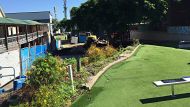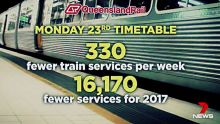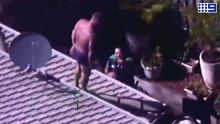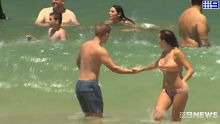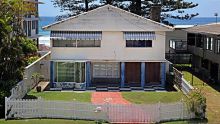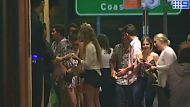EXCLUSIVE
A Melbourne organised crime syndicate is suspected of masterminding a scheme to import $60 million of cocaine using a former Japanese whaling vessel, which was boarded by authorities last month, despite never entering Australian waters.
More QLD News Videos
$60m 'mothership' drug haul
Four alleged members of a crime syndicate behind a plan to import $60 million worth of cocaine and arrested on Wednesday morning have faced court. Vision courtesy Seven News Melbourne.
The syndicate, based in Melbourne's north-western suburbs, was monitored for about a year before the boat was intercepted about 1300 kilometres off the coast of Tasmania on December 12.
Authorities then spent another five weeks investigating the syndicate before arresting six Victorian men, four in Melbourne and two in Queensland early on Wednesday over the haul of 186 kilograms of cocaine.

Ten men on board the boat when it was raided, nine Chinese and a Singaporean, have already been charged with attempting to import a commercial quantity of a border-controlled drug.
The six Victorian men are expected to be charged with the same offence and face court later on Wednesday.
The syndicate allegedly tried to use an increasingly common method for drug importation, known as the "mothership" method where a ship importing drugs from overseas loiters off the coast before being met by a smaller boat which brings the drugs to shore.
But it is one of the first times this method has been attempted in Victoria, as the seas are considered more treacherous than in New South Wales, Queensland and Western Australia, where similar schemes have been detected.

The joint operation targeting the drug syndicate and the boat, codenamed Barada, has been heralded by law enforcement as an almost unparalleled effort of collaboration.
It involved the Australian Federal Police and Victoria Police's joint organised crime task force, Australian Border Force, Australian Defence Force, Australian Criminal Intelligence Commission and Tasmania Police.

Sources said it was legally complex and quite uncommon for a boat to be raided despite never entering waters in Australia's Exclusive Economic Zone.
But, after the boat was found to have started moving even further from Australia, authorities gained approval for the operation, based on strong evidence that a significant amount of drugs was aboard.

The Navy's amphibious assault ship HMAS Adelaide was then used to intercept the 50-metre vessel.
It is suspected the crew had deliberately avoided entering Australian waters, knowing it made their interception less likely.
 Authorities are still investigating the exact weight, purity, and origin of the cocaine, but it is expected that at least 180 kilograms was onboard, and that it came from South America.
Authorities are still investigating the exact weight, purity, and origin of the cocaine, but it is expected that at least 180 kilograms was onboard, and that it came from South America.
The drug had been wrapped in bricks weighing about one kilogram and packed into nine hessian sacks which were found in a small storage room on the boat.
The origin of the Kaiyo Maru No.8, which was last registered in Japan, is also being investigated.
It remains unclear where the boat was launched from, although authorities believe that because of modifications to the vessel, including the installation of extra fuel tanks, it was possible it could have avoided docking for many months.
It will be investigated if the vessel had been used to make other drug shipments, although it is unlikely the Melbourne syndicate had attempted any other large-scale importations.
It is suspected the crew were sailing towards South America when they were intercepted.
AFP Acting Deputy Commissioner Neil Gaughan said the investigators that worked on the operation had put in "long hours over the last few months to stop this group benefiting from the exploitation of Australians".
"Investigations into organised crime syndicates such as this are incredibly complex and require significant resources, patience and sophisticated police work to get successful results."
Australian Border Force Commissioner Roman Quaedvlieg said there had been an increase in commercial vessels, including from China, being used for drug importation.
"This operation highlights the sophisticated and highly converged nature of transnational crime; an ex-research vessel, crewed by nine Chinese nationals and one Singaporean national, and attempting to import cocaine produced in South America."
The collaborative effort by law enforcement to reduce the harm caused by illegal drugs would continue, Victoria Police Deputy Commissioner Shane Patton said.
More details about the arrests will be released at a press conference on Wednesday afternoon.
Last month, authorities cracked open the gang behind the largest cocaine bust in Australian history.
It is alleged the Sydney-based syndicate had also attempted several importations using the "mothership" method, and had sourced the cocaine from Chile.



